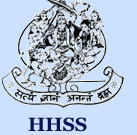thereafter
the father was transferred to Kurnool, and the family accordingly
moved to to that place. Here, after a very few years Mr.Venkata
Rao died in harness, leaving two sons, young Krishnaswami and
his elder brother the late Mr.Kanchi Subba Rao. Soon after this
calamity, Mr.Subba Rao who was then about 20 years old, secured
employment and with his samll income maintained the family and
educated his young brother. When Mr.Subba Rao was transferred
to Nellore as a Tahsildar, the young Krishnaswami was placed
in the Venkatagiri Maharaja's High School for his education.
From here, he went over to Madras and joined the Government
High School(now known as the Presidency College) and passed
the Matriculation Examination. Being too poor to afford a University
education, he was obliged to discontinue his further studies,
but was fortunate to procure early enough a footing in the District
Court at Nellore as a Translator. On account of his dilignece,
extreme intellignece and quick despatch of work and above all
his urbanity and suavity of manners, he rose to the position
of Head Clerk in that court. Not being satisfied with his samll
equipment, he studied and passed very creditably the Pleaders'
Test and the Criminal Higher Examinations, and was conceiving
an idea of relinquishing his appointment to become a lawyer.
The then District Judge coming to know of this rebuked him for
his madresolve, as he found in the young man talent for things
higher. A short time thereafter when a few Munsiffs were appointed,
Mr.Krishnaswami Rao was one among them. After serving as a District
Munsiff in a number of districts, he became the chief Justice
of Travancore in the year 1884.
After serving for nearly 13 years as the chief Justice of that
State, he was finally appointed Dewan of that State in the year
1897. For about 6 years he administered the State with remarkable
tact and judgment, and easily earned the approbation of the
Suzerian Government, who conferred on him the title of Companion
of the Indian Empire having already a few years before conferred
on him the title of Dewan Bahadur. Ultiamtely he retired from
service in the year 1903 and settled in Madras.
Endowed with abundant physical and mental energy, though
60 years ol, Mr.Krishnawamy Rao could not remain idle and
enjoy rest. He found that he was wanted everywhere and very
soon found himself connected with many public and private
institutions, for whose further advancement he that the present
success and eminence of the United India Life Assurance co.,
Ltd., the Madras Central Urban Bank (as it was then known),
The S.M.S.O. Nidhi, Triplicane, is all due entirely to his
sagacity and lead.
In addition to the institutions above named, he was also
for very many years the president of the Hndu High School
Committee, Triplicane, the Mahratta Education Fund , Mylapore,
and the National Fund and Industrial Association, Mount Road.
He was fist co-opted as a member of the Hindu High School
Committee. Very soon he was elected President on the demise
of the late Rao Bahadur Singarachariar in 1909. Till 1923,
he continued to be the President. On that Committee he was
happily associated with the late Dewan Bahadur M.O.Parthasarathy
Iyengar, the late M.Rangachariar and the late Venkataranga
Rao who all took parental interest in the progress of the
institution.
Over and above all these diverse activities he was also
taking from time to time active interest in politics. He ws
the President of the Madras provincial Congress Committee
at one of their Annual Assemblies at Ranipet and on another
occasion he was the Chairman of the Reception Committee of
the Indian National Congress at one of its sittings in Madras
under the Presidentship of the late Dr.Rash Behari Ghose.
This noble gentleman fell sick and breathed his last on 2nd
February 1923 with the whole town mourning his loss. So much
was he loved and esteemed, that the Sheriff called for a public
meeting at the Victoria Public Hall to give public expression
to the great loss sustained by the City in his passing away
and to concert measures to perpetuate his memory. A sum of
about Rs. 6,000 was collected and with that amount a scholarship
was instituted by the University to commemorate his memory.
|
